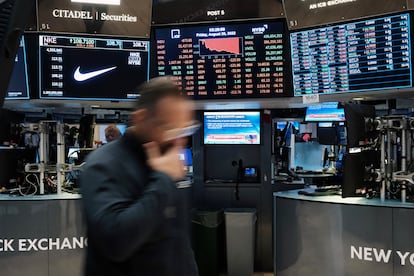As midterms loom, entrenched US inflation will lead to more rate hikes
Joe Biden faces the November elections amid the biggest price increases in the US since the presidency of Jimmy Carter


Two people on Thursday awaited the United States’ September consumer price index with particular interest. One was Jerome Powell, president of the Federal Reserve, who after the publication of the data is expected to raise interest rates again in November and December. The other was US President Joe Biden, who is heading into a crucial midterm legislative election under the weight of the highest inflation since Jimmy Carter was in the White House in 1978.
In the midterm elections that year, Carter’s Democrats lost four senators and 15 representatives but they did manage to retain a majority in both the House and the Senate. Biden does not have that margin for error as the Democrats hold a precarious majority of three seats in the House of Representatives, where all 435 seats are up for grabs, and only have the narrowest of advantages in the Senate, where Vice President Kamala Harris holds the tie-breaking vote in an upper chamber split 50-50 between the Republicans on one side and the Democrats and Independents on the other.
The economy has become a millstone around Biden’s electoral neck. Inflation weighs more heavily on the minds of voters than employment figures and prices are on the rise in America regardless of political persuasion. The consumer price index data for September will be the last published before the November 8 midterms. As expected, the famous Inflation Reduction Act has done its job for campaign purposes but it has done little bring prices down.
The figures are somewhat worse than expected and show that price increases are becoming entrenched. In September, year-on-year inflation has decreased marginally, from 8.3% to 8.2%, but core inflation, which excludes food and energy, has increased again to 6.6%. That is the highest level in four decades and it indicates that inflation has spread throughout the entire economy, which makes it harder to combat. Powell is the man responsible for tackling this rise and he has already approved the most aggressive interest rate hikes since the early 1980s. After the consumer price index data was released, the stock markets dipped but then rallied again.
At their last meeting, the members of the committee that decides the Federal Reserve’s monetary policy unanimously indicated two more interest rate hikes before the end of the year, at their November 1-2 and December 14-15 meetings. To date, federal fund rates have gone from almost zero to a range of 3% to 3.25% this year. These rates are at their highest level since 2008, at the height of the financial crisis that led to the Great Recession. Governors anticipate two further hikes of 0.75+0.50 points or 0.50+0.50 points.
The minutes from the most recent meeting, which were released on Wednesday, show that the committee members are concerned about not doing enough to fight inflation. “Many participants emphasized that the cost of doing too little to reduce inflation is likely to be greater than the cost of doing too much,” the minutes state.
If necessary, Powell is willing to induce a recession to lower demand and tame inflation. Biden is aware of that; on Tuesday, the US President admitted in an interview with CNN that the United States may experience what he termed “a mild recession,” although he downplayed its importance.
Rate hikes have already significantly affected the mortgage market. Thirty-year mortgage rates for home purchases have risen to 6.81%, their highest levels since 2006, according to data that the Mortgage Bankers Association released on Wednesday.
Rent hikes are increasing underlying inflation, but nearly every product category is becoming more expensive and at a pace that has not been seen in decades. Gasoline prices had decreased somewhat, but the decision by the Organization of the Petroleum Exporting Countries (OPEC) to cut production threatens to raise prices at the pumps again.

Social Security payments to increase by 8.7%
With the release of September’s inflation figures, it is now possible to calculate the increase in the Social Security payments that millions of Americans receive. The payments will go up by 8.7 %, the highest increase in Social Security payments since 1981. Thus, Social Security recipients will be able to maintain their purchasing power.
The increase in Social Security payments affects tens of millions of Americans and will go into effect in January. The payments are calculated by using a specific formula that takes into account increases in the cost of living.
Tu suscripción se está usando en otro dispositivo
¿Quieres añadir otro usuario a tu suscripción?
Si continúas leyendo en este dispositivo, no se podrá leer en el otro.
FlechaTu suscripción se está usando en otro dispositivo y solo puedes acceder a EL PAÍS desde un dispositivo a la vez.
Si quieres compartir tu cuenta, cambia tu suscripción a la modalidad Premium, así podrás añadir otro usuario. Cada uno accederá con su propia cuenta de email, lo que os permitirá personalizar vuestra experiencia en EL PAÍS.
¿Tienes una suscripción de empresa? Accede aquí para contratar más cuentas.
En el caso de no saber quién está usando tu cuenta, te recomendamos cambiar tu contraseña aquí.
Si decides continuar compartiendo tu cuenta, este mensaje se mostrará en tu dispositivo y en el de la otra persona que está usando tu cuenta de forma indefinida, afectando a tu experiencia de lectura. Puedes consultar aquí los términos y condiciones de la suscripción digital.








































